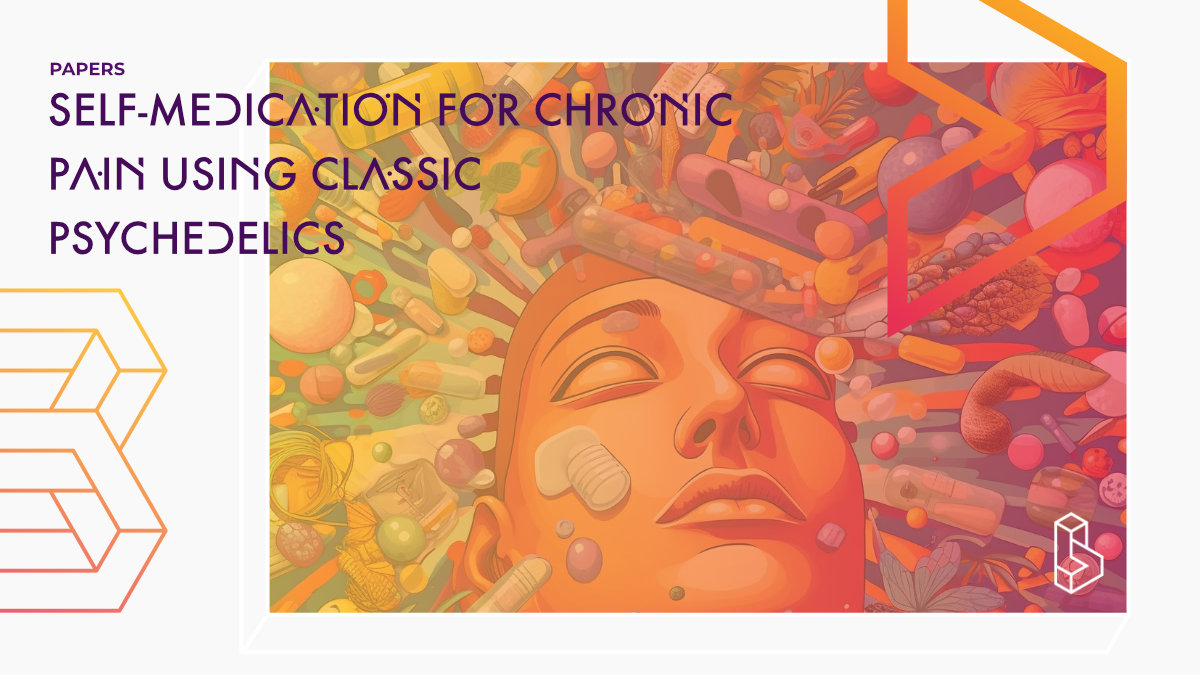In this qualitative study (n=11), people living with chronic pain who self-medicate with psychedelic drugs were interviewed. Participants reported improved pain scores during and after psychedelic experiences across various psychedelics. Positive Reframing and Somatic Presence were identified as playing a role in enhancing well-being. Participants employed other techniques including mindfulness, breathwork, and movement.
Abstract of Self-Medication for Chronic Pain Using Classic Psychedelics
“Background: Chronic Pain is among the leading causes of disability worldwide with up to 60% of patients suffering from comorbid depression. Psychedelic-assisted therapy has recently been found effective in treating a host of mental health issues including depression and has historically been found to be useful in treating pain. Reports of self-medication for chronic pain using psychedelic drugs have been widely documented, with anecdotal evidence indicating widespread success in a range of pathologies.
Aims: In preparation for an upcoming trial, to better understand how those with lived experience of chronic pain self-medicate with psychedelic drugs, and to establish, in detail, their therapeutic protocols and practices for success.
Methods: As part of patient-involvement (PI) for an upcoming trial in this population, 11 individuals who reported self-medicating with psychedelic drugs took part in a one-hour semi-structured discussion, which was then transcribed and thematically analysed.
Results: Across a range of psychedelic substances and doses, reported pain scores improved substantially during and after psychedelic experiences. Two processes, Positive Reframing and Somatic Presence, were reliably identified as playing a role in improvements in mental wellbeing, relationship with pain, and physical (dis)comfort. Inclusion of other strategies such as mindfulness, breathwork, and movement were also widely reported. Due to the data’s subjective nature, this paper is vulnerable to bias and makes no claims on causality or generalizability. Together, these results have been used to inform study design for a forthcoming trial.
Conclusion: This pre-trial PI work gives us confidence to test psychedelic therapy for chronic pain in a forthcoming controlled trial. The results presented here will be instrumental in improving our ability to meet the needs of future study participants.”
Authors: Julia Bornemann, James B. Close, Meg J. Spriggs, Robin L. Carhart-Harris & Leor Roseman
Summary of Self-Medication for Chronic Pain Using Classic Psychedelics
Public and Patient Involvement (PPI) aims to produce research “by” and “with” people with lived experience, and is an emerging topic in the psychedelic field. It involves incorporating non-researcher input into various parts of the research cycle.
People living with chronic pain report feeling misunderstood and invalidated. In-depth, open-ended discussions and thematic analysis are widely used in PPI to ensure a thoughtful design that prioritizes the needs of people with chronic pain.
Roughly 20% of the global population live with chronic pain, which significantly impacts their ability to work and social life. The stress of living with chronic pain also contributes to psychological well-being, with rates of comorbid depression up to 60% in conditions such as Fibromyalgia Syndrome.
Find this paper
https://doi.org/10.3389/fpsyt.2021.735427
Paywall | Google Scholar | Backup | 🕊
Cite this paper (APA)
Bornemann, J., Close, J. B., Spriggs, M. J., Carhart-Harris, R., & Roseman, L. (2021). Self-medication for chronic pain using classic psychedelics: a qualitative investigation to inform future research. Frontiers in Psychiatry, 12, 735427.
Study details
Topics studied
Fibromyalgia
Pain
Study characteristics
Interviews
Qualitative
Participants
11
Humans
Authors
Authors associated with this publication with profiles on Blossom
Robin Carhart-HarrisDr. Robin Carhart-Harris is the Founding Director of the Neuroscape Psychedelics Division at UCSF. Previously he led the Psychedelic group at Imperial College London.
Leor Roseman
Leor Roseman is a researcher at the Centre for Psychedelic Research, Imperial College London. His work focussed on psilocybin for depression, but is now related to peace-building through psychedelics.
Institutes
Institutes associated with this publication
Imperial College LondonThe Centre for Psychedelic Research studies the action (in the brain) and clinical use of psychedelics, with a focus on depression.

